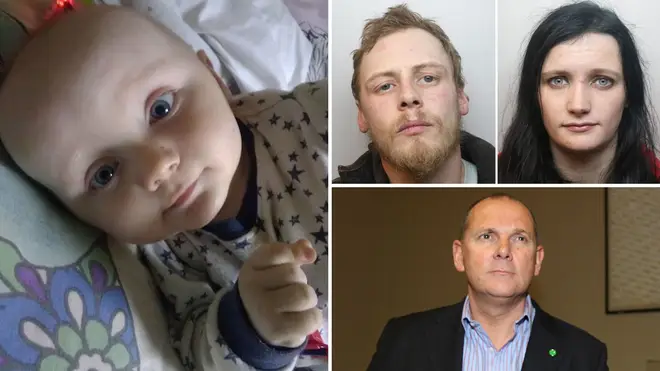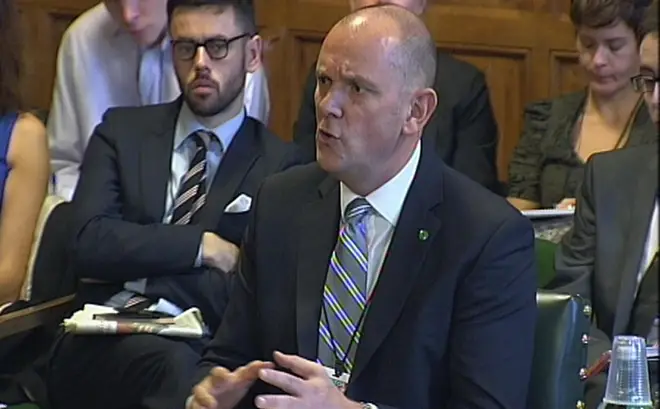
Matthew Wright 7am - 10am
28 March 2024, 17:26 | Updated: 28 March 2024, 17:43

Covid is no excuse for the death of Finley Boden, a former National Crime Agency chief has said after the baby was murdered by his parents just weeks after child services returned him back to the drug-addled couple's care.
Jim Gamble, who previously headed up the Child Exploitation and Online Protection Command for the National Crime Agency, was speaking after the children's services apologised after a review found safeguarding practice was inadequate in the final weeks of Finley's life.
The children's agency involved in the decision to return Finley to the couple said it was "profoundly sorry that together we were unable to prevent his death".
The problems in Finley's case "cannot be mitigated by Covid", Mr Gamble, who is now CEO at the INEQE Safeguarding Group, told LBC's Shelagh Fogarty on Thursday afternoon.

Mr Gamble said there were "so many early warning signs about poor home conditions, parental conflict, disengaging and long-arming services, suspicions of drug use, families that don't register with the GP - those are all multiple red flags."
Finley's parents Shannon Marsden and Stephen Boden were both found guilty of the murder in April last year. They were both handed life sentences with respective minimum terms of 27 and 29 years at Derby Crown Court in May.
The 10-month-old was killed on Christmas Day 2020. Marsden and Boden burnt and beat the child, where they inflicted a total of 130 separate injuries on him.
Finley had a fractured thigh, a broken pelvis, numerous burn marks, 71 separate bruises, sepsis, and an infection in the lining of his heart.
It comes as a review into the safeguarding practices published today acknowledged that Covid 19 regulations and their consequences had "exacerbated" the couple's inaccessibility to professionals, but added that the local authority had accepted "more could have been done to 'work' the case and to formulate the final care plan" in spite of the "unique" pressures of the pandemic.
"The practice simply was not good enough" in Finley's case, Mr Gamble said, commenting on the process that saw the child returned to his parents by his social services. It was "an accident waiting to happen," he concluded.
"Of course Covid and the subsequent lockdowns and the change in working practices were a shock to the system.
"But I have seen systems across the country in social care ... where they pivoted and prioritised children who were the most vulnerable and at the greatest risk."
He said "no one was covered in glory" in the process that saw Finley returned to his parents, including the judge whose decision ultimately led to the baby returning to his parent's care.
Mr Gamble said the parents were "obviously not capable of looking after themselves, let alone a baby."

The former National Crime Agency boss also commented on the state of the child services system itself. He said the system considered a mark of success to be fewer children going into care. Mr Gamble said the mark of success should instead be "more children being safer - and some children need to be in care".
"We've got to stop this at all costs keeping children in the family if the family represents the risk."
The former child protection boss said he's frequently reminded of the words of someone who had been in foster care: "My worst day in care was better than my worst day in care."
"We need to reflect on lived experience like that and not fall into the stereotypical position where we are being forced down 'put the child back as soon as you can with the family'."
He continued: "In 2021, there were 650,000 plus referals made to children's social care. We're talking about an environment where there are too few people doing far too much work."
Mr Gamble also took aim at the Government for playing "musical chairs" which had a "consequence" on social services.
"Not only do you have a workforce that's under massive pressure, they're continually trying to change things - very often in my experience to reduce costs."
It comes after Derby and Derbyshire Safeguarding Children Partnership and Derbyshire County Council also apologised for returning Finley to his parents, with the latter recognising there had been "missed opportunities".
A review into the circumstances leading up to his murder said the 10-month-old "should have been one of the most protected children in the local authority area" but found "significant shortcomings" in plans for him to be reunited with his parents.
A Local Child Safeguarding Practice Review into Finley's death, published by the safeguarding children partnership on Wednesday, said while Finley's parents were responsible for his death, "professional interventions should have protected him".
The review, which has been anonymised, said: "In this instance, a child died as the result of abuse when he should have been one of the most protected children in the local authority area."It said the "most significant professional decision" was that he should live with his parents, and concluded that "the safeguarding environment in which that decision was made had been incrementally weakened by the decisions, actions, circumstances and events which preceded it".
Most of what had been experienced by Finley in the final weeks of his life "was unknown to professionals working with the family at that time", the report said.
But it added: "The review has found, nevertheless, that safeguarding practice during that time was inadequate."
It noted there had been a six-week period where a social worker was off sick and that during that time no social work visits to Finley or his parents took place.